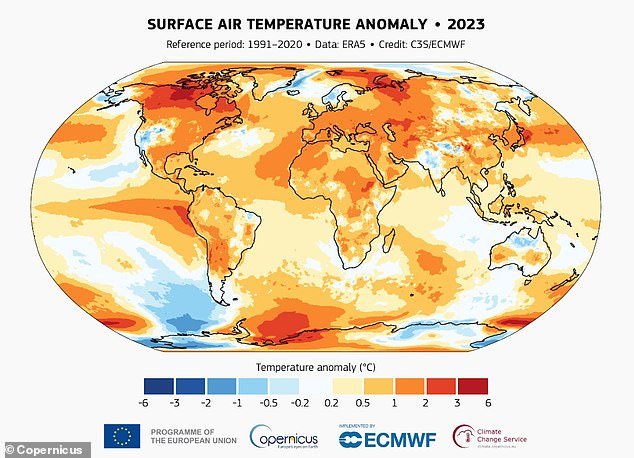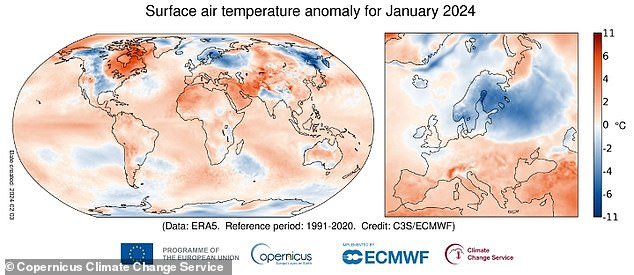Table of Contents
- Global average temperatures were 13.14°C last month, 0.7°C above average
- This is the eighth consecutive month in which records have been broken.
Last month was officially the hottest January ever recorded, experts from the Copernicus Climate Change Service (CS3) have confirmed.
Global average temperatures were 13.14°C (55.6°F) – 0.7°C (1.26°F) above the 1991-2020 average for January.
It is also 0.12 °C (0.21 °F) higher than the temperature of the previous warmest January, which was recorded in 2020.
This marks the eighth consecutive record-breaking month, with each month since June being the hottest ever recorded.
“2024 begins with another record month,” said Samantha Burgess, Deputy Director of C3S.
Last month was officially the hottest January ever recorded, experts from the Copernicus Climate Change Service (CS3) have confirmed.

Global average temperatures were 13.14°C (55.6°F) – 0.7°C (1.26°F) above the 1991-2020 average for January. Pictured: Bondi Beach on January 21
CS3 scientists use a combination of satellites, ships, planes and weather stations to monitor the weather around the world.
Their measurements reveal that the global average temperature of the last 12 months is the highest recorded, in 0.64°C (1.15°F) above the 1991-2020 average and 1.52°C (2.73°F) above the 1850-1900 pre-industrial average.
Here in the UK, parts of north-west Scotland recorded exceptionally high temperatures in January.
Achfary (Sutherland) recorded a staggering daily high temperature of 19.9°C (67.8°F), beating the previous UK temperature record in January by a very wide margin of 1.6°C (2.8 °F).
Meanwhile, Kinlochewe (Wester Ross) recorded 19.6°C (67.2°F), also breaking the previous record.
However, this was not the case across the entire European continent.
In the Nordic countries, average temperatures in January were found to be well below the 1991-2020 average.

2023 is confirmed as the warmest calendar year in global temperature data records dating back to 1850. The global average air temperature was 58.96°F (14.98°C), about 0.3° F (0.17 °C) higher than the 2016 result.
Outside Europe, average temperatures were well above average in eastern Canada, northwest Africa, the Middle East and central Asia.
Instead, they were below average in western Canada, the central United States and most of eastern Siberia.
The new data comes shortly after CS3 confirmed that 2023 was the hottest year on record.
Last year’s global average temperature was 58.96°F (14.98°C), about 0.3°F (0.17°C) higher than the result in 2016, the previous warmest year.
“The extremes we have observed in recent months provide dramatic testimony to how far we are now from the climate in which our civilization developed,” said Carlo Buontempo, director of C3S.
“This has profound consequences for the Paris Agreement and all human endeavors.”
According to Ms Burgess, there is only one way to stop this rise in global temperatures.
“The only way to stop the rise in global temperatures is to rapidly reduce greenhouse gas emissions,” he said.

